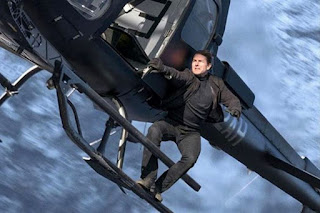Thinking too much: A Sunday Notebook, Part 1
Some items from the list on my desk ...
Leslie Moonves. The head man at CBS is under fire for accusations of repeated sexual misconduct, as reported by Ronan Farrow in the New Yorker. When I was a TV critic and on press tours, Moonves was a popular figure with many because of his charm and his accessibility, not to mention he was a smart guy. But that does not remotely excuse what appears to be years of aggression and threats on his part; in fact, it makes it worse because his public likability hid so much. And, as Farrow reported, CBS had a toxic environment which must be blamed on the man in charge. As my friend Mo Ryan tweeted about Farrow's piece, it "gets at the core of my frustration in reporting on these issues: The institutional complicity & enabling. For decades. Systematic silencing." Also from Ryan: "without real, *systematic* change on an *institutional* level, those abused and assaulted will continue to be driven out & abusers will continue to do what they do. More quietly."
Robin Williams. I crossed paths with Robin Williams a little over 30 years ago, when he held a press conference promoting the TV film "Seize the Day; he was at once manic and guarded, in the latter case loudly fending off a mild personal question from a reporter. The HBO documentary, "Robin Williams: Come Inside My Mind," shows how difficult life was for Williams when he was not performing, how very sad he could be. The piece does well at showing both Williams' dazzling stage work, with generous clips, and his private life, through interviews with friends (notably Billy Crystal and Pam Dawber) and family. Wrenching in the extreme, when paired with HBO's "The Zen Diaries of Garry Shandling," it may have you thinking, "I am so glad I am not funny." Sure, some comics manage to lead stable lives. Still, the internal reasons for great comedy can be torture.
Ted Williams. Yes, I saw him, too, back in the '70s when a shopping mall was opening and Ted was there on behalf of Sears, which had an anchor store in the mall. Fans were thrilled to see him, far away from Boston though he was; I remember one carrying an old magazine with Williams on the cover, likely for an autograph. Williams did not look all that happy about the whole thing, scowling for the most part, but doing his duty in a few brief remarks. And he would not have been there at all if he had not been, as a PBS telecast recently observed, an American Master. The series' Ted Williams documentary feels too short, at less than an hour, but still covers Williams' achievements (including his advocacy for African-American ballplayers), his wartime heroics, his professional limitations (as a manager, for instance), his personal failings (not a good husband) -- and the way he was loved, embodied by his appearance at the 1999 All-Star Game. A good way to spend part of a baseball-season afternoon, or to while away a rain delay.
Goodbye, "Nashville." If nothing else, the series finale of "Nashville" this week was impressively tidy, wrapping up the main characters's storylines in the waning moments of an hour-long episode, and then bringing the cast and crew together onstage for a heartfelt farewell. And, after six season on ABC and then CMT, it was time for it to do so. The departure of Raina (Connie Britton) had been a severe but not fatal blow; instead, the soap-operatic aspects of the show became overwhelming (Juliette trapped in a cult was especially hard to endure). I liked the long journey of Deacon Claybourne (and the performance by Charles Esten, who could somehow get to me most of the many times Deacon was on the verge of tears), although here, too, there were narrative quirks (Highway 65's troubles going poof, Deacon's public scandals fading away).
Later: "Last Chance U," "Mamma Mia," "Who Is America" and whatever else pops in my head.



Comments
Post a Comment